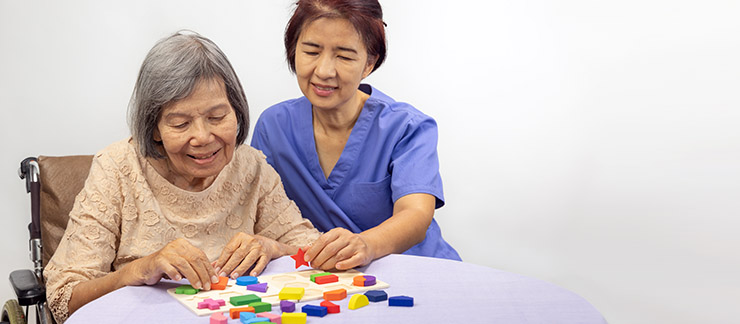
3 Myths About Alzheimer’s and Dementia Home Care for the Elderly
If your elderly loved one is diagnosed with Alzheimer’s disease or dementia—or is showing signs of cognitive decline—you may feel overwhelmed and unsure where to look for trusted home care information and support.
In some cases, the misconceptions about Alzheimer’s and dementia care can cause confusion and frustration — and may even prevent you from exploring available senior care options.
It’s crucial to separate the facts from fiction about Alzheimer’s and dementia home care.
Below are a few common myths—and realities—you should know to help your elderly loved one receive the dedicated and comforting assistance they need.
Myth 1: If Your Loved One Has Alzheimer’s or Dementia, They Need to Live in a Nursing Home
Fact: Seniors with Alzheimer’s disease or dementia can safely receive care in the comforts of their homes.
Individuals with Alzheimer’s or dementia require higher levels of support. Visiting Angels’ dedicated and professional caregivers understand the conditions and can provide compassionate non-medical personal home care assistance to ensure your loved one's well-being and safety.
While nursing facilities offer specialized assistance, a move to a nursing home may upset your elderly loved one due to unfamiliar surroundings, new people, and different routines. A nursing home may be used as a last resort for your loved one, but hiring an in-home personal caregiver can extend their precious time at home — helping them to remain content, safe, and engaged for as long as possible.
Myth 2: Personal Caregivers Aren’t Experienced in Alzheimer’s and Dementia Care
Fact: Many Visiting Angels’ caregivers have personal or professional experience and are trained in Alzheimer’s and dementia care.
Many Visiting Angels’ caregivers have a vast knowledge and skillset in Alzheimer’s and dementia care for the elderly. Some have worked at assisted-living facilities or community programs that serve older adults. Others have direct experience providing paid or unpaid personal care services for a relative, friend, or neighbor with Alzheimer’s or dementia.
Visiting Angels takes a “character-first” approach to hiring. Although previous experience is a plus, we select candidates who have compassion for older adults and find fulfillment in meeting their personalized needs.
Visiting Angels’ caregivers have access to extensive professional training through “Visiting Angels University.” Topics include:
- Understanding the stages of Alzheimer’s and dementia
- Managing anger, fear, and confusion
- Interpreting the needs of people with Alzheimer’s and dementia despite communication barriers
Caregivers can also pursue additional certifications through other reputable industry organizations.
Myth 3: Your Elderly Parent With Alzheimer’s or Dementia Can Manage Themselves at Home
Fact: Alzheimer’s and dementia can dramatically affect your loved one’s safety and ability to care for themselves.
Alzheimer’s and dementia are progressive disorders, meaning they worsen over time. Even if your loved one is experiencing mild symptoms right now, their condition is likely to deteriorate in the upcoming months and years.
A Visiting Angels’ caregiver will assist your loved one in the early stages of the disorder. A strong caregiver-client bond allows them to feel secure and supported as their needs change. An in-home caregiver will monitor your loved one’s condition and environment — helping them to maintain as much independence as possible while reducing the risk of accidents, injuries, and self-neglect. The caregiver or a supervisor will also communicate any concerns to you.
Learn More About Visiting Angels’ Alzheimer’s and Dementia Care
If your elderly loved one has been diagnosed with dementia or Alzheimer’s disease, an in-home personal care assistant could be the right option for your family. To learn more about how Visiting Angels can help, schedule a free home care consultation today.


